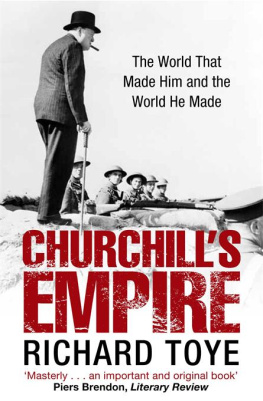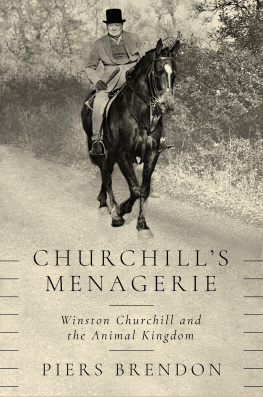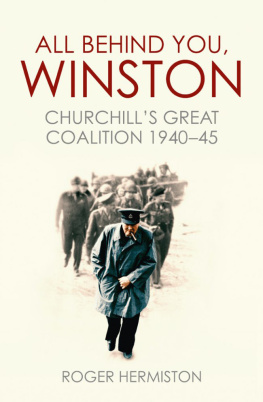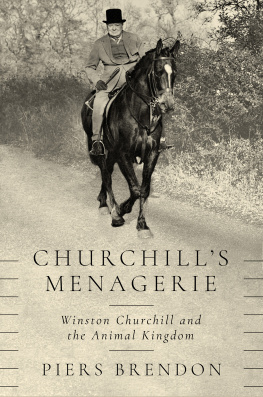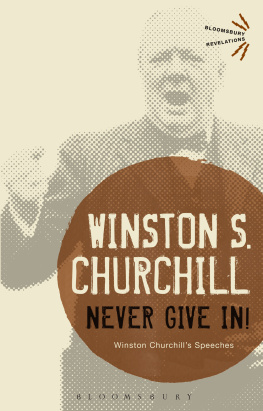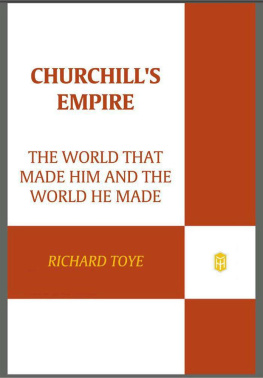THE ROAR OF THE LION
THE ROAR OF THE LION
THE UNTOLD STORY OF CHURCHILLS WORLD WAR II SPEECHES
RICHARD TOYE


Great Clarendon Street, Oxford, OX2 6DP,
United Kingdom
Oxford University Press is a department of the University of Oxford.
It furthers the Universitys objective of excellence in research, scholarship,
and education by publishing worldwide. Oxford is a registered trade mark of
Oxford University Press in the UK and in certain other countries
Richard Toye 2013
The moral rights of the author have been asserted
First Edition published in 2013
Impression: 1
All rights reserved. No part of this publication may be reproduced, stored in a retrieval system, or transmitted, in any form or by any means, without the prior permission in writing of Oxford University Press, or as expressly permitted by law, by licence, or under terms agreed with the appropriate reprographics rights organization. Enquiries concerning reproduction outside the scope of the above should be sent to the Rights Department, Oxford University Press, at the address above
You must not circulate this work in any other form
and you must impose this same condition on any acquirer.
British Library Cataloguing in Publication Data
Data available
ISBN 9780199642526
Printed in Great Britain by
Clays Ltd, St Ives plc
Links to third party websites are provided by Oxford in good faith and for information only. Oxford disclaims any responsibility for the materials contained in any third party website referenced in this work.
Acknowledgements
I would like to thank the numerous people who have helped bring this book into being. Luciana OFlaherty at Oxford University Press commissioned it, and she and her colleague Matthew Cotton were extremely supportive throughout the writing and editorial process. Several other people at OUP also gave valuable assistance, notably Emma Barber. Edwin Pritchard made an excellent job of the copyediting, and Michael Parkin created the index. I am grateful too to the anonymous referee who made some valuable suggestions to help improve the manuscript, and to the other external readers who supported the project in the first place. Furthermore, as always, I am indebted to my wonderful agent, Natasha Fairweather, and her splendidly efficient assistant, Donald Winchester.
The University of Exeter remains a delightful place to work: no one could hope for better colleagues. Several of them discussed the issue of Second World War rhetoric with me, in particular: James Mark, Richard Overy, Matthew Rendle, Nicholas Terry, and Tim Rees. I benefited much from Andrew Thorpes encyclopaedic knowledge of war time British politics. A period of university research leave ensured that the book could be completed in a timely fashion.
Other friends provided valuable help and advice. Gary Love commented on the Introduction. Peter Clarke kindly allowed me to see the manuscript of his wonderful book Mr. Churchills Profession in advance of publication. Warren Dockter similarly shared the text of his excellent forthcoming work Churchill and the Islamic World. Allen Packwood and his team at the Churchill Archives Centre provided their usual invaluable assistance. Jason Dinsdale persuaded me to go on Twitter (@RichardToye)with what effect remains to be seen.
Churchill studies is now entering the electronic era, with the digitization of Churchills own papers completed in 2012. Most of the research for this book was carried out in the conventional way, but the sites publishers kindly allowed me access to it shortly before the official launch, which assisted me in the final stages.
Mass-Observation material is reproduced with permission of Curtis Brown Group Ltd, London on behalf of The Trustees of the Mass Observation Archive Copyright The Trustees of the Mass Observation Archive. Quotations from the speeches and writings of Sir Winston Churchill are reproduced with permission of Curtis Brown, London on behalf of the Estate of Sir Winston Churchill Copyright Winston S. Churchill.
Throughout the writing of this book Kristine Vaaler and our sons Sven and Tristan were sources of pleasure and inspiration. My friends Gary Price and Mike Bush helped take my mind off work by, respectively, playing badminton and going running with me. I am also grateful to Katherine Waugh and Simon Stanhope for their friendship and it is to them that I dedicate this book.
Contents
O n 30 November 1954, Sir Winston Churchill turned eighty. That day, at a special ceremony in Westminster Hall, he was presented by both Houses of Parliament with gifts, including an overly candid portrait of himself by Graham Sutherland. Churchill hated it so much that his wife Clementine later ordered it to be destroyed. The public occasion, however, was all harmony. Labour Party leader Clement Attleewho had defeated Churchill at the 1945 election and kept him out of Downing Street for six yearspaid tribute to the Prime Minister, recalling his stirring wartime speeches. You offered us only blood and sweat and tears and we gladly took your offer, he said. Then Churchill, a little unsteady on his feet, made his reply, which included a justly famous passage:
I was very glad when Mr. Attlee described my speeches in the war as expressing the will not only of Parliament but of the whole nation. Their will was resolute and remorseless and, as it proved, unconquerable. It fell to me to express it, and if I found the right words you must remember that I have always earned my living by my pen and by my tongue. It was a nation and race dwelling all round the globe that had the lion heart. I had the luck to be called upon to give the roar.
This was a superb piece of rhetoric, in which he neatly avoided appearing to take too much credit for the power of his oratory. As one of his acquaintances, the former Liberal MP Arthur C. Murray, had written: I have always held the opinion strongly that Churchill in the Second World War represented magnificently the will of the British nation to win the war, but it is nonsense to suggestas has been donethat but for Churchill the British nation would not have continued the fight alone when France capitulated in the middle of June, 1940. The suggestion, indeed, is a libel on the British nation.the other hand claiming to have acted as the mouthpiece of the entire British people. The speech was a master-class in the exercise of mock humility.
Although Churchill has received much criticism from historians over many aspects of his career, his Second World War speeches have been more or less immune. This, of course, is because most (but not all) of them were of a very high literary quality. Yet if, for this reason, they are justly renowned, most peoples knowledge of them is nonetheless confined to a few famous phrases excerpted from a limited number of radio broadcasts made in the summer of 1940. And the iconic status of these has tended to deflect critical scrutiny from the speeches considered as an entire body, from the outbreak of war in 1939 through the election campaign of 1945. This book isremarkably enoughthe first to offer a comprehensive, archive-based analysis of Churchills wartime rhetoric as a whole. It will analyse not just his (relatively rare) radio appearances but also his parliamentary performances, as well as speeches in the country and abroad. It considers his oratory not merely as a series of great speeches but as calculated political interventions which had diplomatic repercussions far beyond the effect on the morale of listeners in Britain. Considering his failures as well as his successes, the book seeks to move beyond the essentially celebratory tone of much of the existing literature. It aims to offer insight not only into how the speeches were written and delivered but also into how Churchills words were received at home, within the Empire, amongst allies and neutrals, and within enemy countries. It explores his speeches in the context of the global media war that was fought alongside the military campaigns.
Next page







